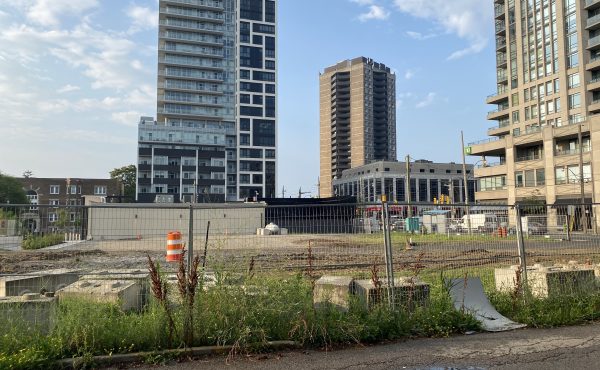
I live-blogged an interesting conference last week at the University of Toronto Law School called “Is there Planning Law or just City Politics?” on municipalities, law, and land use planning . The live blog has a detailed description, but I thought I’d share some of the highlights here.
In the first panel, on “prominent city lands,” former chief planner of Toronto Paul Bedford answered the conference question by saying “All planning is political – live with it, learn to work it.” It was a message that was evident in the examples used in many presentations in the conference. And the politics doesn’t just arise from the involvement of politicians — even within the ranks of professional planners there are competing theories and ideas.
At the same time, though, planning isn’t just political. It’s clear that there’s a constant tension between politics on the one hand and planning expertise and ideals on the other — a tension that has the potential to be creative when managed well. Richard Sommers, Dean of the Faculty of Architecture at the University of Toronto, offered the example of his work in the Hell’s Kitchen neighbourhood of Manhattan, balancing development pressures with the needs of the existing residents, and Sheldon Levitt of Quadrangle Architects Limited offered the example of his firm’s work on a plan for a dense, mixed-use new town centre for Markham.
The next panel on the Ontario Municipal Board (OMB) was especially interesting because it gave the perspective of two lawyers who regularly represent developers in front of that tribunal. They made the point that, for those who have opinions about the OMB but have not actually seen it in action, the process is open to the public and anyone can see how it works by attending a hearing (it’s based at 655 Bay Street). Paul Bedford also earlier pointed out that the City of Toronto has had the power to remove at least some cases from the OMB’s jurisdiction since 2006 but hasn’t acted on it yet. It needs to do so if it is serious about reforming the planning process.
The lawyers made good points about how arbitrary and political the section 37 (of the Planning Act) process is, where developers pay the City extra funds for community projects in order to build extra storeys, often in negotiation with the local city councillor. But one of them also explained that one reason why the system is arbitrary is that the City is not actually allowed to create a consistent formula, because then it would be a tax and therefore unconstitutionally beyond the city’s powers.
However, the lawyers seemed oblivious to the idea that many people see re-zoning applications themselves, where a developer buys land zoned at one density and gets it rezoned at much higher density, as an arbitrary, political process that enriches developers; and that one reason the City relies on s. 37 is that the ability to appeal to the OMB makes planning unpredictable and hard to enforce. While they believed that the system works, more or less, to me the panel suggested the system is dysfunctional and arbitrary for everyone involved, including developers.
The next panel, in the afternoon, focused on ethics, with two panelists discussing the Mississauga inquiry into Mayor McCallion’s involvement in land deal her son was working on. A really interesting perspective came from the lawyer for a pension fund that was a landowner in Mississauga, explaining how difficult and uncomfortable it was for a corporation to slowly realize that strange, political things were happening around a land deal but they couldn’t figure out the full story. His presentation highlighted that a strong City ethics code and commissioner was valuable to investors because it provided an assurance of greater transparency regarding their investments in the city. And, as someone pointed out, a $350,000/year office for an ethics commissioner is a lot less expensive that a $7 million inquiry.
Another theme that emerged during the conference fascinated the academic presenters — the fact that a City can legislate on the basis of aesthetics. Prof. Mariana Valverde of U of T noted that municipalities in Canada are the only level of government that are allowed to legislate on the basis of aesthetics — for example, deciding where billboards can go on the basis of their aesthetic effect on an area. It’s been an interesting question for a long time — Prof. Markus Dubber of the U of T law school explored a seminal case from 19th century Berlin, where the city authorities prevented a building going up because it would interfere with a street view to a historic monument, but the courts overturned this decision because aesthetics were not within the state’s power. From other presentations during the day, it’s clear that this city power still puzzles some landowners, who do not understand why municipalities can try to tell them what to do with their land in so much detail.





5 comments
“…former chief planner of Toronto Paul Bedford answered the conference question by saying “All planning is political – live with it, learn to work it.”
That’s a different tune from the one he was playing at the time of crafting the New Official Plan. Then, Bedford assured community-minded stakeholders that there were significant policies and guidelines to protect neighbourhoods. Now, the edges of TO neighbourhoods are being eroded by the effects of political influence over TO Planning Department. We pay for professional planners and we have very right to expect professionalism, not pandering to councillors. It’s a corrupt mix that marginalizes communities. Mr. Bedford suggests we must get close to our councillors and City planners. That alone says a lot about the level of professionalism in planning in Toronto today.
What in the name of holy hell is that statue grouping?
Nastiest thing I have ever seen.
A dog torn apart by two goblins. Just the thing for a playground.
“But one of them also explained that one reason why the system is arbitrary is that the City is not actually allowed to create a consistent formula, because then it would be a tax and therefore unconstitutionally beyond the city’s powers.”
nope. Toronto has specific taxing powers by the Municipal Act and can levy direct taxes by the constitution just like the provinces. A ‘consistent formula’ applied to developers might end up an unconstitutional indirect tax, but that’s not clear here.
I’m assuming that it would indeed be considered an indirect tax. The point was that it would be a tax that was not within the city’s powers.
I’m not sure it would be indirect. It would be taken directly from the group the city aimed to tax, development to offset the needs required by the development. To be indirect there would be a question of whether by design they are passed on to someone else. Development charges for instance are allowed despite being similarly indirect, but because they are used specifically to pay for the services required, they are allowed. The same might apply here.